Is Tipping Common in France? Occasionally—Here’s When and How Much to Tip

After enjoying a delightful lunch at a quaint French café, you glance at the bill. Should you leave a tip? The answer is yes—especially if the service was exceptional.
In France, tipping customs dictate that gratuity isn’t usually necessary for staff in restaurants, taxis, or hotels, as service fees are already included in your bill. Employees receive a fair wage and don’t depend on tips for income. While hospitality workers, from servers to bellhops, earn a decent salary and receive benefits like paid leave, customers may still offer a small tip to express gratitude for outstanding service, with amounts varying by establishment and service level.
Follow these practical tips to understand tipping etiquette while traveling in France, applicable in cities and rural areas alike, whether you're in Paris or the countryside.

Photo by montatip lilitsanong/Unsplash
Tipping is not mandatory in French restaurants and cafés
In both local cafés and Michelin-starred restaurants, a service charge of 15 percent is legally included in the bill in France. This charge is typically noted on the menu or the final bill with the term “service compris.” However, if you receive exceptional service from a friendly waiter, you might consider leaving a small tip (un pourboire), but it’s certainly not required.
In more tourist-focused eateries, you may encounter some bold waiters suggesting that a tip isn't included. While they may be technically correct that a gratuity is not part of the bill, remember you are not obligated to leave a tip.
For a simple drink, rounding up to the nearest euro or leaving 20 to 50 centimes per drink is common. For meals at casual cafés or restaurants, a tip of one to two euros per person is appreciated. In fine-dining venues, where service is notably attentive, consider tipping between 5 to 10 percent.
It’s advisable to carry some change or small notes for tipping, as French credit card slips do not allow for tips (service is included in the price). You can request the waiter to add a tip before they finalize the total on the credit card machine; however, this method doesn’t guarantee that the tip reaches the staff. Thus, keeping a few loose euros handy is a smart idea.

Photo by Diego Fernandez/Unsplash
Tipping for taxi services and private chauffeurs
Although tipping taxi drivers isn’t obligatory, many locals tend to round up to the nearest euro or offer up to 5 percent. If the driver helps with your luggage (especially if it’s bulky), it’s customary to give one or two euros per bag.
For private car services, like prearranged airport transfers or all-day car tours, a tip of 5 to 10 percent is appropriate. With Uber, you’ll always have the option to tip your driver, following the same guideline: if you enjoyed the ride, feel free to add a gratuity through the app.

Courtesy of Château d’Estoublon
Tipping Practices in Hotels
Depending on the hotel and the services you request from the staff, there are various occasions where leaving a gratuity may be considered appropriate.
- Luggage handlers: One to two euros per bag
A couple of euros is a small price for assistance with your bags as you navigate lobbies, elevators, and hallways. - Doormen: One to two euros
It's perfectly acceptable to give a few notes to those who help hail cabs or provide valet services. - Room service staff: A few euros
It’s polite to offer a couple of notes or coins to the staff delivering your meals. Don’t hesitate to ask for change or directions to the nearest ATM at check-in. - Housekeeping: Two to four euros per day
These unsung heroes ensure our stays are comfortable. You can give the tip directly or leave it in an envelope in your room or at the front desk. - Concierge: Five to 20 euros
If you’ve requested help from your concierge for restaurant bookings or other services, consider tipping five to 20 euros, depending on the complexity of their assistance. A thorough recommendation and arrangement for a tour should merit a larger tip than a simple dinner reservation.

Photo by Uby Yanes/Unsplash
Tipping in French spas and beauty salons
In France, it’s customary to tip hairdressers, beauticians, massage therapists, and other wellness professionals between 5 to 10 percent, so you might want to prepare some cash beforehand.
Tipping theater ushers
While ushers typically earn a salary, it's common to give a euro or two in private theaters. Therefore, if you’re attending the opera, a classical concert, or a play, be sure to have some coins on hand.

Photo by Unsplash/Getty
Tipping for tours, classes, and other tourism-related services
Tipping in France can be somewhat ambiguous. When you book a private tour, class, or excursion directly with a guide or instructor, the fee is typically flat, so tipping isn't expected. However, if you use an online booking platform, a tour company, or your concierge, leaving a gratuity of 10 to 20 percent is appreciated if you're satisfied with the experience. If you're uncertain, refer to your booking confirmation, as it usually contains details about tipping in the fine print.
Recently, there has been a rise in “free tours” in major cities. While labeled as “free,” guides often pay a set fee (around two euros) to the tour company for each participant, regardless of dropouts. If you enjoy one of these tours, consider tipping your guide at least five to seven euros per person so they can also offer a tip to the waiter at their favorite café.
Are there instances where tipping might be considered inappropriate?
In general, a tip is appreciated by French people when a service has been provided. However, one significant faux pas in French tipping etiquette is the notion that a larger tip is always better. Flashy displays of wealth, including leaving a large tip after a meal, are often frowned upon. While small tips are always welcome, leaving €100 after a €25 meal in a Paris café—even for excellent service—may not be well-received.
This article first appeared online in 2022 and was updated on January 11, 2024, to reflect current information.
Evaluation :
5/5



